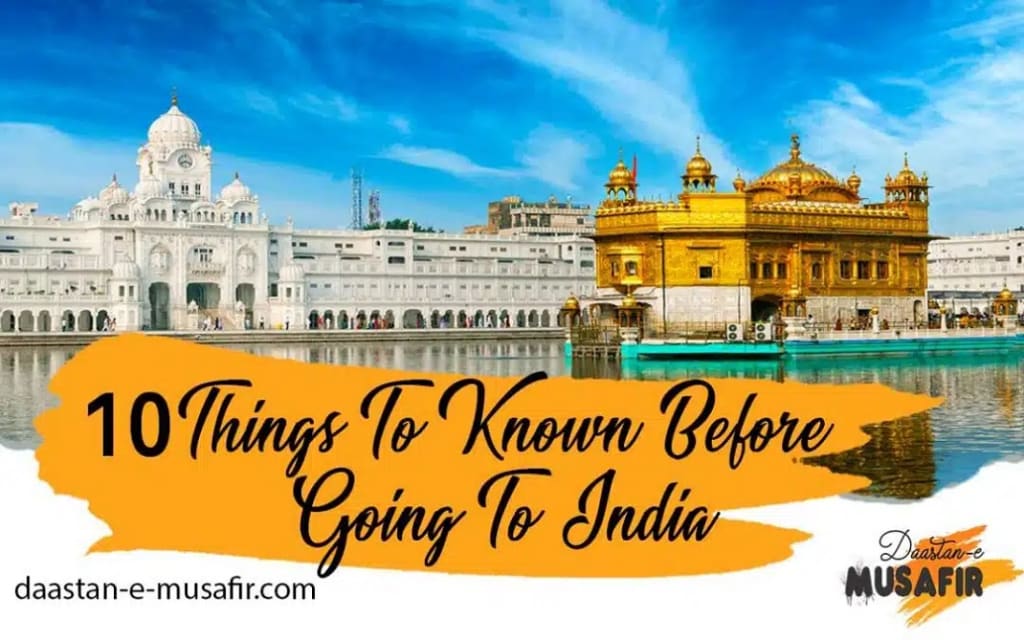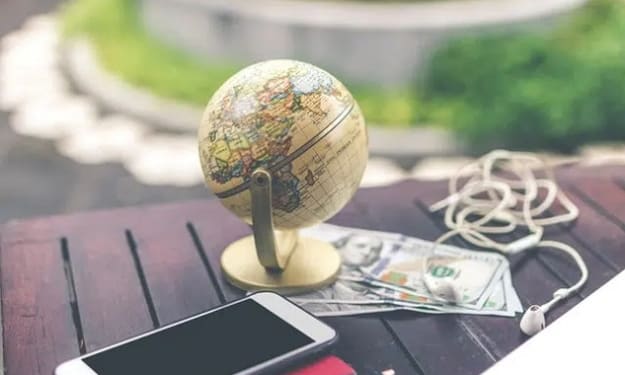10 Things To Known Before Going To India
10 Things To Known Before Going To India

10 Things To Known Before Going To India
Culture shock: India is a culturally rich and diverse country, so it's essential to be prepared for a potential culture shock. You may encounter customs, traditions, and behaviors that are unfamiliar, so it's helpful to read about Indian culture before you go.
Climate: India has a tropical climate, so you should prepare for hot and humid conditions. It's also important to be aware of monsoon season, which typically lasts from June to September and can bring heavy rains and flooding in some areas.
Food and water: Indian cuisine is delicious but can be spicy and unfamiliar to some. Make sure you try street food at your own risk as it may not be safe due to hygiene concerns. Also, be careful about drinking tap water or eating uncooked food, as it may cause stomach issues. It is advised to carry bottled water.
Safety: India is generally a safe country for travelers, but you should always take precautions, especially when traveling alone or at night. Be mindful of pickpockets and scams, especially in tourist areas.
Language: Although English is widely spoken in India, especially in urban areas, it's useful to learn some basic Hindi or regional languages for communication purposes.
Transportation: India has a vast transportation system, including trains, buses, and taxis. It's essential to research the best mode of transportation before traveling to a particular region.
Clothing: Indians typically dress conservatively, especially in rural areas. As a tourist, it's best to avoid wearing revealing or provocative clothing. Dress modestly and comfortably, especially if visiting religious sites.
Money: India's currency is the Indian Rupee. It's best to exchange money at authorized exchange bureaus or banks. Credit cards are widely accepted in cities and tourist areas.
Religion: India is a deeply religious country, and you'll find temples, mosques, and churches throughout the country. Be respectful of religious customs and practices, especially when visiting holy sites.
Etiquette: Indian culture places great importance on etiquette, so it's helpful to be aware of some basic rules. For example, it's customary to remove shoes before entering someone's home or a temple. It's also important to use your right hand for eating and passing objects, as the left hand is considered unclean.
What you need to know before visiting India?
Before visiting India, there are several things you should know to ensure a safe and enjoyable trip:
Visa: Most visitors to India require a visa, which can be obtained through the Indian embassy or consulate in your home country.
Health: India can pose health risks, so it's important to take precautions. Make sure you have all necessary vaccinations, carry insect repellent and sunscreen, and be cautious when eating and drinking.
Transportation: India has a vast transportation system, but it can be chaotic and overwhelming. Consider hiring a driver or using pre-paid taxis to get around.
Accommodation: There is a wide range of accommodation options in India, from budget hostels to luxury hotels. Do your research and book in advance, especially during peak travel season.
Culture and customs: India has a rich and diverse culture, so it's important to be respectful of local customs and traditions. Dress modestly, remove your shoes before entering homes and temples, and avoid public displays of affection.
Language: English is widely spoken in India, but it's helpful to learn some basic Hindi or regional languages to communicate with locals.
Money: The Indian currency is the rupee, and it's best to carry cash in smaller denominations. ATMs are widely available in cities, but be cautious of using them in remote areas.
Safety: India is generally a safe country, but it's important to take precautions, especially when traveling alone or at night. Be aware of pickpockets, scams, and avoid traveling in areas with high crime rates.
Food: Indian cuisine is delicious but can be spicy and overwhelming for some. Be cautious of street food and drink bottled water to avoid stomach issues.
Etiquette: Indian culture places great importance on etiquette, so be respectful of local customs and traditions. Avoid pointing with your feet, and use your right hand for eating and passing objects.
How to plan a trip for beginners in India?
Planning a trip to India for beginners can seem overwhelming, but here are some steps to help you get started:
Choose your destinations: India is a vast country with a rich cultural heritage and diverse landscapes. Research popular destinations such as the Golden Triangle (Delhi, Agra, and Jaipur), Mumbai, Goa, and Kerala. Decide on the places you want to visit based on your interests and the time you have available.
Determine the best time to visit: India has a varied climate, so it's essential to plan your trip according to the weather conditions. The best time to visit India is from October to March when the weather is cool and dry.
Book your flights: Search for flights to India and book your tickets in advance to save money. Check for deals and discounts, and compare prices from different airlines.
Obtain a visa: Most visitors to India require a visa, which can be obtained through the Indian embassy or consulate in your home country. Apply for a visa well in advance of your trip.
Book accommodation: India has a wide range of accommodation options, from budget hostels to luxury hotels. Research and book your accommodation in advance, especially during peak travel season.
Plan your transportation: India has a vast transportation system, including buses, trains, taxis, and tuk-tuks. Research the best mode of transportation for your destinations and budget. You can also consider hiring a driver for long-distance travel.
Research local customs and etiquette: India has a rich culture and diverse customs and traditions. Research local customs, dress codes, and etiquette to avoid offending locals.
Learn some basic phrases: Although English is widely spoken in India, learning some basic Hindi phrases can be helpful, especially in rural areas.
Take necessary health precautions: India can pose health risks, so make sure you have all necessary vaccinations and carry insect repellent and sunscreen. Avoid drinking tap water and be cautious when eating street food.
Purchase travel insurance: Travel insurance can provide you with peace of mind in case of any unexpected events, such as flight cancellations, lost luggage, or medical emergencies.
By following these steps, you can plan a safe and enjoyable trip to India as a beginner.
What are the risks of traveling to India?
Traveling to India poses some risks that travelers should be aware of, including:
Health risks: India has a high risk of diseases such as malaria, dengue fever, and hepatitis A and B. Travelers should take precautions such as getting necessary vaccinations, using insect repellent, and avoiding street food to reduce the risk of illness.
Crime: Crime rates in India are generally low, but petty crime such as pickpocketing, bag-snatching, and scams are prevalent in tourist areas. Travelers should take precautions such as keeping valuables secure and avoiding unfamiliar places at night.
Traffic: India has a high rate of traffic accidents, and the chaotic traffic can be overwhelming for visitors. Travelers should take precautions such as using a reputable taxi or car service, wearing a seatbelt, and avoiding driving themselves.
Natural disasters: India is prone to natural disasters such as floods, earthquakes, and cyclones. Travelers should check weather conditions and follow local authorities' advice to avoid dangerous areas.
Terrorism: India has been the target of terrorist attacks in the past, especially in tourist areas. Travelers should be aware of the risk of terrorism and avoid crowded places or political gatherings.
Cultural differences: India has a rich and diverse culture, and travelers should be aware of local customs and etiquette to avoid offending locals unintentionally.
Scams: Tourists in India are frequently targeted by scams, such as fake travel agents, overcharging, and inflated prices. Travelers should be cautious and use reputable vendors and services.
By being aware of these risks and taking necessary precautions, travelers can have a safe and enjoyable trip to India. It is always recommended to consult with your country's embassy or consulate in India and follow their travel advice.
What is the best first time trip to India?
India has a diverse range of attractions, and the best first-time trip to India depends on your interests and the time you have available. However, here are some popular destinations that are great for first-time visitors:
The Golden Triangle: The Golden Triangle is a popular tourist circuit that includes Delhi, Agra, and Jaipur. It's an excellent introduction to India's rich history, culture, and architecture, with famous landmarks such as the Taj Mahal, Amber Fort, and Qutub Minar.
Goa: If you're looking for a beach getaway, Goa is a popular destination with beautiful beaches, laid-back vibes, and a mix of Indian and Portuguese culture. It's a great place to relax and unwind after a busy tour of other destinations.
Kerala: Kerala is a state in South India known for its scenic beauty, backwaters, beaches, and lush greenery. It's a great place to experience India's natural beauty and relax in serene surroundings.
Mumbai: Mumbai is India's largest city and a bustling metropolis with a rich cultural heritage, colonial architecture, and a vibrant nightlife. It's a great place to experience the modern side of India and explore its diverse cuisine, shopping, and entertainment.
Rajasthan: Rajasthan is a state in North India known for its majestic forts, palaces, and colorful culture. It's a great place to experience India's royal heritage and explore the desert landscapes, camel safaris, and local markets.
These destinations are well connected and easily accessible for first-time visitors, making them great choices for a first-time trip to India. You can also consider hiring a reputable tour operator who can customize your itinerary and help you plan a safe and enjoyable trip.
About the Creator
daastanemusafir
https://daastan-e-musafir.com/
Enjoyed the story? Support the Creator.
Subscribe for free to receive all their stories in your feed. You could also pledge your support or give them a one-off tip, letting them know you appreciate their work.






Comments
There are no comments for this story
Be the first to respond and start the conversation.